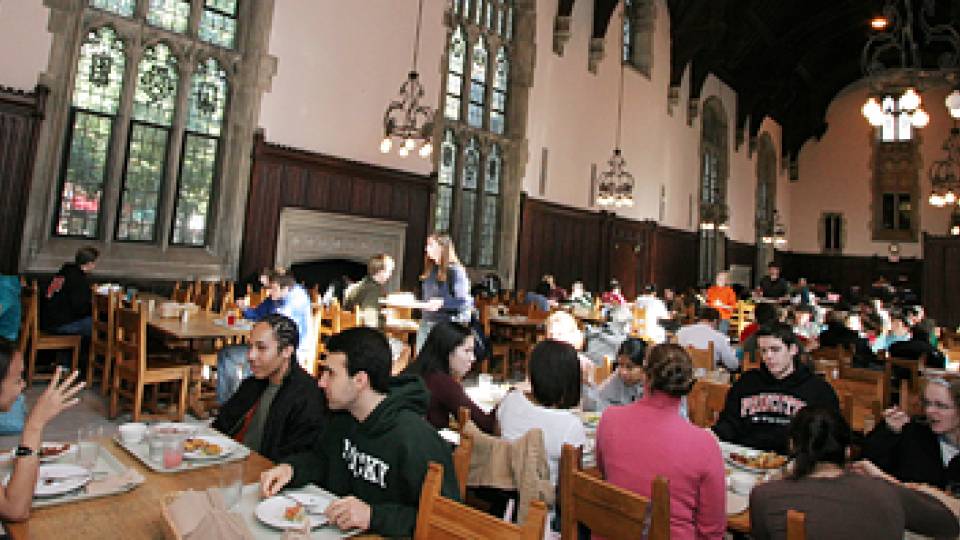Plans are under way to turn Campus Club, a former eating club that
has been donated to the University, into a gathering space for
Princeton undergraduate and graduate students.
The University intends to renovate the building for use as a place
where students can gather informally between classes as well as a place
that they can reserve for dinners, receptions, musical and other
cultural events, social events, meetings, precepts and more.
“We’re very excited about the opportunity that Campus Club will give us
to provide additional social gathering options for students,” said Amy
Campbell, special assistant to Vice President for Campus Life Janet
Dickerson.
Campus Club, which was founded in 1900, closed in 2005 after
experiencing financial difficulties. Its membership voted last November
to donate the building, located on the southeast corner of Washington
Road and Prospect Avenue, to the University. The University assumed
ownership of the building on Aug. 1.
“Although we are deeply saddened by the closure of the Princeton Campus
Club that played such a large part of our undergraduate lives, we are
excited by the opportunity to preserve and, to the extent possible,
enhance the role that Campus Club will play for Princeton
undergraduates, alumni members of the club and University alumni in
general going forward,” said Anne Trevisan, a 1986 alumna who chairs
the club’s graduate board.
“Our donation of the club to the University ensures that the historic
club building itself will continue to be cherished,” she added.
“Perhaps more importantly, the use of the building that has been
outlined in the donation agreement means that Campus Club will have a
dynamic and ongoing role at the center of the University campus, and
will continue to enrich the lives of students and alumni for many more
years to come.”
Club members and other alumni will continue to have access to the
facility on certain occasions, such as after home football games and
during Reunions and Alumni Day weekends. The University has agreed to
preserve the appearance and character of the building, particularly the
exterior and the principal public spaces within the building. An
advisory committee of three Campus Club representatives and two
University representatives will be established and consulted on the
uses of the facility and renovations.
Work is expected to begin this academic year on the three-story
Collegiate Gothic style building, which was designed in 1909 by
architect Raleigh Gildersleeve, who also designed McCosh Hall and
several other eating clubs. Renovations will include a general sprucing
up and refurbishing, as well as accessibility improvements, including
the installation of an elevator. Flexible furnishings will be provided
so that the rooms can accommodate a variety of uses, and the facility
will retain a catering kitchen. Plans call for the building to re-open
to students in spring 2008.
In the meantime, University officials are moving ahead with
programmatic plans for the facility. Dickerson’s office has been
engaged with students in a broad effort aimed at enhancing the
nonacademic life of Princeton students.
This past spring, administrators from the offices of campus life, the
dean of undergraduate students, University services and others met with
groups of undergraduate and graduate students to find out what kind of
spaces they think should be more readily available on campus.
One type identified is a social venue open to all students. “The eating
clubs have dances and social gatherings, but a lot of times they are
only open to club members,” Campbell said. “Campus Club will be open to
the entire student community, so that students who are members of clubs
as well as students who are not members of clubs will be welcome to use
the space or reserve it for a meeting, precept or event.
“We also have very few spaces on campus where students can host a
dinner,” she continued. “Current options include renting space at a
club or using the Carl Fields Center, but they are often booked with
other events and can be expensive. Campus Club will provide an
additional place where student groups can meet and enjoy a special
dinner.”
Campbell said that students also identified the need for an informal
place to “just hang between classes, to watch TV, play video games, or
just a place to relax. While the Frist Campus Center has those kinds of
spaces,” she said, “it’s very much a public thoroughfare. Students are
looking for the cozy living room of home, where they can just toss
their books down, flop on a chair, read a book.”
Alex Lenahan, a Princeton senior and president of the Undergraduate
Student Government, has been involved in the planning for Campus Club.
“The goal of the space will really be to give students -- whether
they’re independent, in a club, in a college or anything else -- a
place to interact in a very comfortable social setting, and complement
the functions that Frist already serves. We pictured students using the
club as a place to hang out both during the day and the night, and at
night especially have the club provide a different sort of social
option for students that should help make all students’ social lives
richer.”
Administrators will be working with students to set up a management
structure that will determine Campus Club’s hours and the process for
reserving rooms. Campbell said, “We expect a student board will include
representatives of different classes and student constituencies.” She
said there most likely will not be a rental fee for students, but there
would be charges for catering and other such services.



